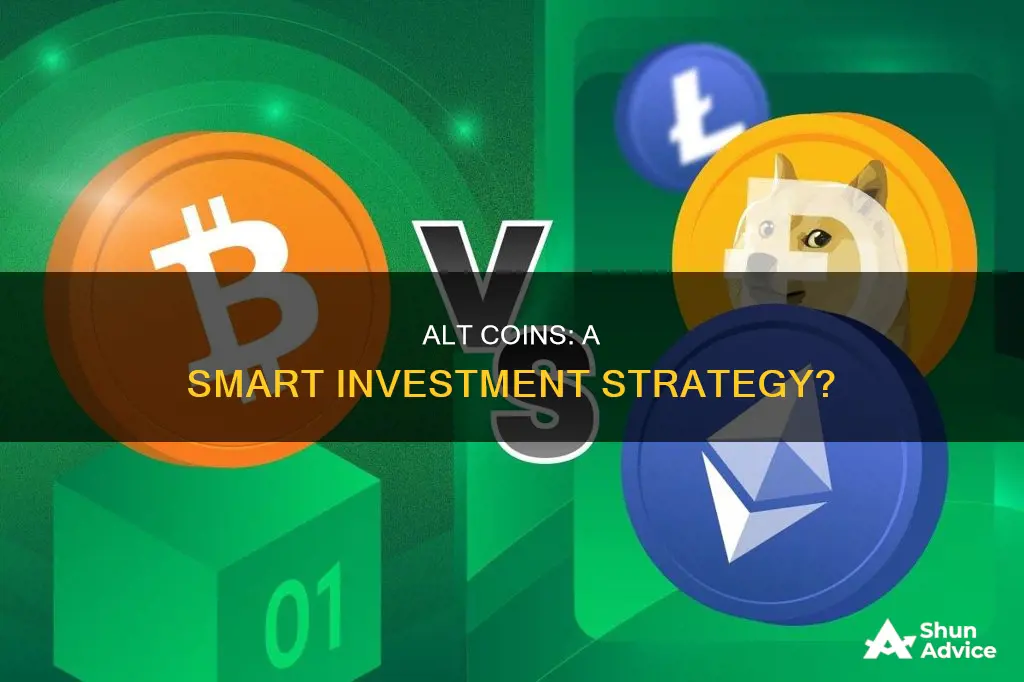
Altcoins are alternative coins to Bitcoin, the world's first widely accepted cryptocurrency. Altcoins are also alternatives to government-issued currencies. They are not physical coins but digital currencies that rely on blockchain technology. There are more than 9,300 altcoins, with a total market capitalization of more than $1 trillion. Altcoins are incredibly risky investments, and it is possible to lose all your money. However, they can be a good investment if you do your research and invest carefully.
What You'll Learn

Altcoins: High-Risk, High-Reward?
Altcoins are any cryptocurrency that is not Bitcoin (or Ethereum). There are thousands of altcoins on the market, and they make up nearly 40% of the total cryptocurrency market.
The Risks
Altcoins are incredibly risky investments. The cryptocurrency market is young and volatile, and altcoins are more volatile than Bitcoin. Altcoin prices are extremely volatile, and most individual investors are not equipped to manage this volatility. There is also little regulation around altcoins, and fraud is rampant in the cryptocurrency market.
The Rewards
Altcoins can be a good investment if you do your research. They offer a much higher upside in terms of percentage gain, and they can be a source of diversification for more traditional portfolios.
What to Consider Before Investing
- Do your research: Understand the risks and know what you're getting into.
- Only invest money you can afford to lose.
- Choose a reliable cryptocurrency exchange with a good track record, strong security measures, and a user-friendly interface.
- Be wary of anyone who tries to give you a definitive answer about whether an altcoin is a good investment.
- Ask questions before buying: Who is behind the altcoin? Does it solve a real problem in a novel way? Is there a community developing around it?
Protecting Your Bitcoin Investment: A Safe Strategy
You may want to see also

Altcoin Volatility: What Makes it Fluctuate?
Altcoins are defined as all cryptocurrencies other than Bitcoin (BTC) and, for some people, Ethereum (ETH). They are alternatives to Bitcoin, but they may be even riskier investments. Altcoins make up nearly 40% of the total cryptocurrency market, with tens of thousands of options available.
Sentiment
As altcoins have no intrinsic value, they are susceptible to significant price fluctuations driven by investor sentiment and narrative. Positive sentiment can cause prices to rocket, while negative sentiment can lead to heavy losses. This is particularly true for altcoins as they are not pegged to a tangible value like gold.
News and Media Outlets
News and media outlets can also influence investor sentiment and cause price volatility. For example, when Proshare's introduced its Bitcoin Strategy ETF in October 2021, Bitcoin's price skyrocketed, but then dropped when investors realized it was linked to Bitcoin through futures contracts.
Investor Experience
The profile of investors in the cryptocurrency market can also impact volatility. The barriers to entry for crypto are low, and anyone with internet access can begin trading. This has resulted in a large number of retail investors entering the market, particularly following the COVID-19 pandemic. The more retail investors in the market, the less experienced the market becomes, and the more susceptible it is to manipulation through misinformation.
Regulation
Finally, the lack of regulation in the cryptocurrency space contributes to volatility. Cryptocurrencies are built on distributed blockchain technology, which means they are decentralized and not tied to any single location. This makes it difficult for established regulatory frameworks to control them. Governmental regulatory efforts to stem the growth of cryptocurrencies can have a significant impact on investor sentiment and cause price volatility.
In summary, altcoin price volatility is driven by a combination of factors, including investor sentiment, news and media outlets, investor experience, and regulation. While altcoins can offer a high upside in terms of percentage gain, they are incredibly risky investments, and it is more likely that you will lose money than make a profit.
Bitcoin's Investment Mania: Is This Time Different?
You may want to see also

Altcoin vs. Bitcoin: Which is the Better Investment?
Bitcoin and altcoin are both cryptocurrencies that have attracted investors' interest. However, they have distinct features, advantages, and risks that investors should carefully consider before deciding which digital asset to include in their portfolio.
Understanding Bitcoin and Altcoin
Bitcoin, created in 2009, is the first and most popular cryptocurrency. It was designed to be a decentralised digital currency operating independently of central banks and governments. Bitcoin uses blockchain technology to secure transactions and prevent double-spending, maintaining the integrity of its financial system.
Altcoins, or "alternative coins," are cryptocurrencies other than Bitcoin. They emerged as alternatives to Bitcoin, offering different features, use cases, and technologies. Examples of popular altcoins include Ethereum, Litecoin, Ripple, and Cardano, among thousands of others. Altcoins may address perceived limitations in Bitcoin's design or introduce innovations in the cryptocurrency industry.
Factors to Consider
When deciding between investing in Bitcoin or altcoins, several factors should be taken into account:
- Market Capitalisation: Cryptocurrencies with larger market capitalisations are generally considered less risky investments. Bitcoin has a much larger market capitalisation than any altcoin, giving it greater stability.
- Technological Advancements: Technological innovations can significantly impact a cryptocurrency's success. Evaluate the features, consensus algorithm, scalability, and security measures behind each coin to understand its potential in the market.
- Use Cases and Adoption: Altcoins with broader use cases, real-world applications, and a growing user base are more likely to gain mainstream adoption and retain value over time.
- Community and Development Team: A strong community and competent development team can contribute to a cryptocurrency's long-term success and growth.
- Regulatory Environment: A favourable regulatory environment encourages adoption and innovation, while strict regulations may hinder growth. Regulatory uncertainty is a concern for altcoins as they may face more scrutiny as newer and less established digital assets.
Pros and Cons of Bitcoin
Pros:
- Market Dominance and Stability: Bitcoin's large market capitalisation and dominant position make it a comparatively stable and less risky investment.
- Widespread Adoption: As the most well-known cryptocurrency, Bitcoin is widely adopted and accessible for various transactions.
- Store of Value: Many investors view Bitcoin as a digital equivalent of gold, using it as a store of value and a hedge against traditional market fluctuations.
- Strong Security: The Bitcoin network is highly secure, making it extremely difficult to attack or compromise.
Cons:
- Limited Scalability: Bitcoin's infrastructure struggles with scalability, resulting in slower transaction times and higher fees during high network usage.
- Lack of Advanced Features: Bitcoin lacks advanced features like smart contracts and decentralised applications, limiting its potential for growth and diversification.
- Environmental Concerns: Bitcoin's energy-intensive mining process has raised sustainability concerns.
Pros and Cons of Altcoins
Pros:
- Innovation: Altcoins offer unique features and technologies, such as smart contracts and improved scalability, driving growth and potential for mainstream adoption.
- Higher Potential Returns: Some altcoins have experienced exponential growth, offering investors the possibility of higher returns compared to Bitcoin, albeit with increased risk.
- Diversification: Investing in various altcoins can reduce the impact of market volatility on investments.
Cons:
- Higher Risk: Altcoins generally have smaller market capitalisations and lower liquidity, making them more susceptible to price fluctuations and market manipulation.
- Less Established: Altcoins have less established reputations and adoption, making it challenging to gauge their long-term potential.
- Regulatory Uncertainty: Altcoins may face more regulatory scrutiny and uncertainty, negatively impacting their growth and adoption.
The decision to invest in Bitcoin or altcoins depends on investment goals, risk tolerance, and beliefs about each cryptocurrency's potential. Both options offer unique advantages and risks. Diversifying a portfolio with a mix of Bitcoin and altcoins can help spread risk and capitalise on the growth potential of various digital assets. However, it is essential to carefully research and understand each cryptocurrency, diversify investments, and only invest what one can afford to lose.
How to Invest in Dogecoin Using Fidelity
You may want to see also

The Future of Altcoins: What's Next?
The future of altcoins is impossible to predict with certainty. However, it is safe to say that they are here to stay as long as the blockchain technology they were designed for continues to be used and developed.
Altcoins are any cryptocurrencies that are not Bitcoin, and sometimes not even Ethereum. They are designed to improve upon the perceived limitations of Bitcoin and Ethereum, the two cryptocurrencies they are forked from or competing with. Altcoins can be used within their respective blockchains to accomplish something, such as paying transaction fees.
There are tens of thousands of altcoins on the market, and they come in several types based on what they were designed for. Here are some of the most common types of altcoins:
- Payment tokens are designed to be used as currency to exchange value between parties. Bitcoin is an example of a payment token.
- Stablecoins aim to reduce the volatility of cryptocurrency trading by pegging their value to another asset, often a fiat currency, precious metal, or investment asset.
- Security tokens represent fundraising efforts or ownership and are regulated by the Securities and Exchange Commission.
- Utility tokens are used to provide services within a network, such as purchasing services, paying network fees, or redeeming rewards.
- Meme coins are inspired by a joke or a silly take on other well-known cryptocurrencies. They gain popularity quickly through online hype and are often used for short-term gains.
While the future of altcoins is uncertain, it is likely that most of the thousands of altcoins available today will not survive in the long run. The altcoin market will probably consolidate around a few altcoins with strong utility, solid use cases, and a clear blockchain purpose.
If you're considering investing in altcoins, it's important to do your research and understand the risks involved. Cryptocurrency investing is highly speculative and can result in significant losses. It's recommended to only invest money you can afford to lose and to diversify your portfolio to manage risk.
Indian Bitcoin Investment: Is It Legal?
You may want to see also

Regulating Altcoins: How Will it Affect Investors?
The cryptocurrency market is still relatively new and highly volatile, and altcoins make up nearly 40% of this market. Altcoins are any cryptocurrency that is not Bitcoin, and sometimes not Ethereum. There are tens of thousands of altcoins on the market, and they are incredibly risky investments.
Regulating altcoins could provide investors with more protections and assurances, which could make the market more appealing to those who are hesitant to invest due to the high risk. Regulation could also help to reduce the number of scams and fraudulent activities associated with altcoins, which could, in turn, increase investor confidence.
However, regulation may also lead to more government involvement and control over the cryptocurrency market. This could potentially limit the decentralised nature of cryptocurrencies and blockchain technology, which may be viewed as a negative by some investors.
Additionally, regulation could impact the level of anonymity and privacy associated with altcoins. One of the appeals of cryptocurrencies is the ability to conduct transactions without the need for intermediaries like banks. Regulation may require more stringent know-your-customer (KYC) and anti-money laundering (AML) checks, which could reduce the perceived benefits of using altcoins over traditional fiat currencies.
Furthermore, the fast-paced and ever-evolving nature of the cryptocurrency market means that regulation may struggle to keep up. By the time regulations are implemented, the market may have already moved on to new innovations and developments, rendering the regulations obsolete.
Overall, regulating altcoins could have both positive and negative impacts on investors. While it may provide more protections and reduce fraud, it may also limit the decentralised nature of cryptocurrencies and impact privacy. The impact of regulation will depend on the specific details of the regulatory framework implemented and how it evolves with the market.
A Beginner's Guide: Investing in Bitcoin in Pakistan
You may want to see also
Frequently asked questions
Alt coins are any cryptocurrencies that are not Bitcoin. They are alternatives to both Bitcoin and government-issued currencies.
Investing in alt coins can be lucrative, but it is also very risky. Alt coins are highly volatile, and there is little regulation in place. There is also a lot of fraud in the cryptocurrency market.
You can purchase alt coins through an online exchange, such as Coinbase, Binance, Kraken, or Bittrex. You can also buy and sell select cryptocurrencies through digital payment systems like PayPal and Venmo.
There is no definitive answer, but you can research the alt coin, its developers, and its community to determine if it is worth investing in. You should also be aware of the risks and only invest money you can afford to lose.
Alt coins can be a good investment if you do your research and understand the risks involved. They can provide diversification for traditional portfolios, but this must be handled carefully.







